| "I think the question that we need to ask ourselves: Are any residents safe in this country anywhere? We have to focus on sensible gun control." - Buffalo Mayor Byron Brown calls for more federal gun control measures following a mass shooting in his city that left 10 dead Welcome to the "Face the Nation" Five at Five newsletter. Scroll down for your five takeaways from today's broadcast of "Face the Nation with Margaret Brennan" on CBS. Did someone forward you this? Sign-up at cbsnews.com/email. 1. Buffalo Mayor Brown: Shooting suspect "came here to take as many Black lives as possible" 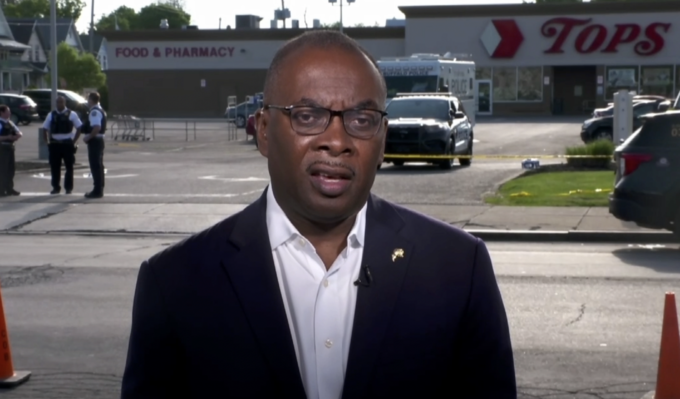 Buffalo Mayor Byron Brown said Sunday that the suspected gunman who opened fire at a supermarket in the city, killing 10 and wounding three, "came here to take as many Black lives as possible." What we asked: "The shooter was allegedly motivated by white supremacist ideology. I know that you are the first African-American mayor of Buffalo, which as a city has been called very segregated, if not one of the most in the country. How do you all unite in the wake of something like this?" What Brown said: "Buffalo is a resilient community. This community has been through a lot. Prior to the pandemic, Buffalo has been going through a renaissance. We're a mid-size American city of over 278,000 people. And this part of the city, 80% African-American but diverse with people of many different backgrounds living in this community, we are certainly saddened that someone drove from hundreds of miles away, someone not from this community that did not know this community that came here to take as many Black lives as possible, who did this in a willful, premeditated fashion, planning this. But we are a strong community and we will keep moving forward." Why it matters: In a hate-filled manifesto purportedly written and posted by the shooter before the attack, he said that he chose the location because it has a high Black population and "isn't that far away." 2. Hochul calls on social media companies to do a "better job" monitoring hate speech 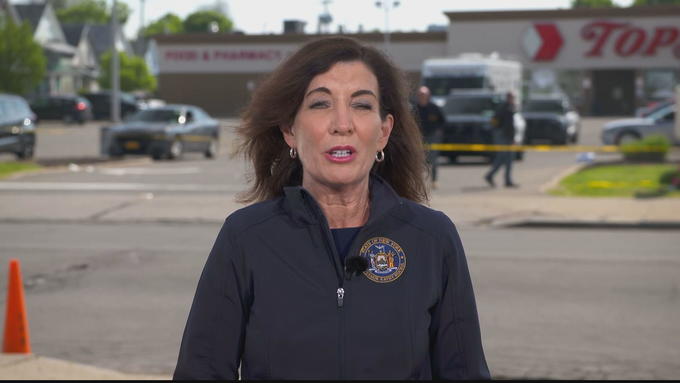 New York Gov. Kathy Hochul, who is from Buffalo, said Sunday that the shooting at a Buffalo supermarket that left 10 dead and three wounded was "white supremacy terrorism" and urged social media companies to step up their enforcement efforts against extremist content. What we asked: "Are you concerned about further violence in your state?" What Hochul said: "Well, we are taking proactive measures to make sure that we're monitoring all social media platforms because this information was out there. This was on a manifesto that was written a while back. And so we're very concerned about what other information is perpetrated out there on social media platforms and are out there being disseminated globally. So this information from yesterday's attack is already out there. It was live streamed. The intent of this individual was telegraphed in advance. So I'm calling on social media platforms to be making sure that they're doing a better job monitoring the hate speech that's out there, especially when it's directed against populations and comes under the guise of white supremacy terrorism, which is exactly what happened here in Buffalo." Why it matters: In the wake of the shooting, Hochul called on internet companies to boost their monitoring of hate speech that "comes under the guise of white supremacy and terrorism," including by hiring more people and changing their algorithms to more quickly identify hate speech. 3. Buttigieg says President Biden is "directly" involved in baby formula crisis 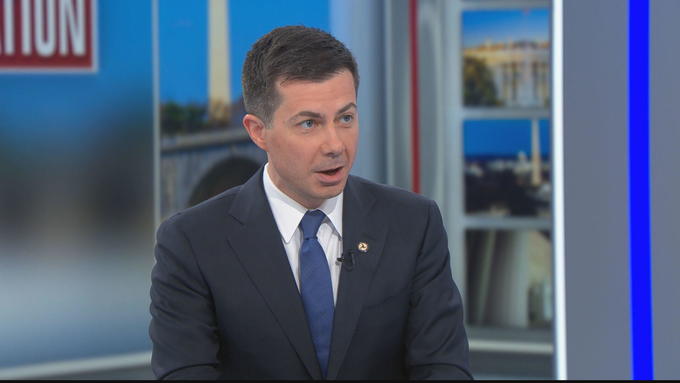 Transportation Secretary Pete Buttigieg said Sunday that the nationwide shortage of baby formula has the attention of the "highest levels" of the Biden administration. What we asked: "I want to ask you a little bit on a personal note. We've been talking about this baby formula shortage nationwide that's been ongoing now for months. You have infants at home. Do you have problems getting a hold of formula?" What Buttigieg said: "Yeah, this is very personal for us. We've got two nine-month-old children, baby formula is a very big part of our lives. And like millions of Americans, we've been rooting around stores, checking online, getting in touch with relatives in other places where they don't have the same shortages to see what they can send over. And we figured it out. We're all set, at least for now. But I think about what that would be like, if you're a shift worker with two jobs, maybe you don't have a car, you literally don't have the time or the money to be going from store to store. That's why this is such a serious issue and that's why it's getting attention at the highest levels, including, of course, direct involvement by the president." Why it matters: To address the shortage being felt by families across the country, the Biden administration is expanding formula products that can be purchased with benefits from the Special Supplemental Nutrition Program for Women, Infants and Children (WIC) program and working with manufacturers to boost importation of formula from abroad.
4. Gottlieb says he does not expect a "big wave" of COVID infection this summer 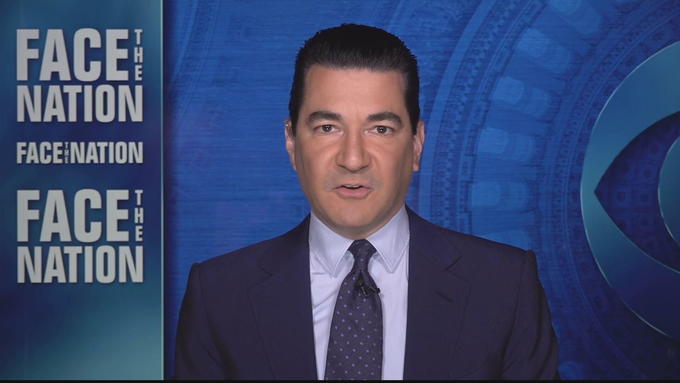 Dr. Scott Gottlieb, the former FDA commissioner, said Sunday that he does not expect to see a "big wave" of infections this summer, despite models being circulated around the Biden administration that suggests otherwise. What we asked: "We had this horrendous milestone this week of 1 million deaths over the entire course of this pandemic. Right now, we're averaging about 326 deaths a week. So we've come a far way. But we heard from both Dr. Fauci and Dr. Walensky this week that they have started putting on masks when they go indoors. Once again, there's concern about an uptick. What do you see in terms of trend lines? Where are we?" What Gottlieb said: "Well, look, we're definitely seeing a surge of infection, particularly in the Northeast and parts of the mid-Atlantic right now. If you look at the modeling going on in those states, states like Connecticut, New York, it does appear that the infections are peaking right now. It's mostly a wave of infection driven by B.2 and this new Omicron variant B.2.12.1 that appears to be more contagious and have more immune escape than prior variants of Omicron. It looks like most of the people who are getting infected aren't people who are previously infected with B.1. But some portion of the 40% of people who escaped the prior wave of Omicron and are now getting caught by this current wave. I do believe that cases will continue to come down. Wastewater data collected by cities does show overall cases coming down and that we shouldn't have a big wave of infection this summer. Although there are models floating around the administration, it does show a big wave of infection this summer. The bottom line is, we didn't see that in 2020. We didn't see it in 2021 when B.1.1.7 emerged in the spring. So this summer should be a backstop against continued spread of this variant, but it does pose a risk for the fall. And it's going to be important to learn whether or not the new newly-formulated vaccines that are now in development will cover this B.2 variant well. Hopefully they will. I believe they will, but that remains to be seen." Why it matters: As the U.S. has loosened COVID restrictions, President Biden last week marked the "tragic milestone" of 1 million deaths nationwide due to the coronavirus. The White House's coronavirus coordinator, Dr. Ashish Jha, continued to warn the pandemic isn't over. 5. Former Trump administration defense secretary says he supports the January 6 select committee 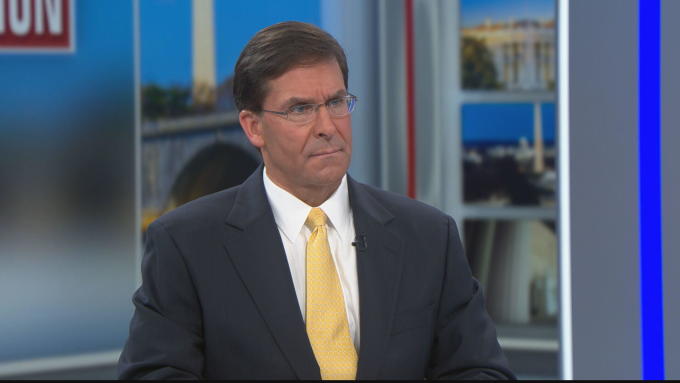 Mark Esper, former Secretary of Defense in the Trump administration, said Sunday that he thinks the House select committee tasked with investigating the January 6 attack on the U.S. Capitol needs to continue its work so "there is a degree of kind of accountability." What we asked: "You did say recently that after the events of January 6, which took place when you were out of office, that you now consider President Trump a threat to democracy. The committee that's investigating January 6 is about to begin public hearings, and they've said they have in their possession a draft executive order that would have had the then defense secretary seize voting machines and that the Department of Justice and the Pentagon would then be involved somehow in stopping the transfer of power. Do you think it's important for that committee to lay out these facts to the public?" What Esper said: "Yes, I think the January 6 committee needs to get to the bottom of the truth of what happened on January 6, the events leading up to it and understand it. So there is a degree of accountability. And second, we have lessons learned to make sure it doesn't happen again. It's absolutely important." Why it matters: Public hearings by the House January 6 select committee are currently slated to start on June 9. This will be the first opportunity the public will have to see the committee's monthslong investigation laid out. |
Post a Comment
0Comments